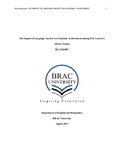The impact of language anxiety on academic achievement among ESL learners
Abstract
Anxiety, kind of emotion which can be considered as complicated state of mind. In learning English as a foreign language classroom context language anxiety is one of the most significant variables. Anxiety influences learner physically and psychologically that makes learner uncomfortable in the ESL classroom. Therefore, making better classroom environment where students feel less anxious is one of the current challenges to ensure effective learning. In this research, a survey had been conducted to analyze 50 students from BRAC University and National University. And the result indicated that 96% of the undergraduate students of BRAC and National University had foreign language classroom anxiety that influences on their normal learning process. The possible sources of foreign language anxiety along with different strategies that can be adapted to reduce foreign language classroom anxiety had been identified. The objective of this study is to examine learner’s level of anxiety in foreign language classroom context, to find out possible sources of foreign language anxiety, and also to suggest possible ways to reduce anxiety in the ESL classroom. To conduct the study different types of instruments had been used including Foreign Language Classroom Anxiety Scale (FLCAS) of Horwitz (1986) that consists of 33 items, structured in a 5-point Likert Scale ranging from “strongly agree” to “strongly disagree.”. “The use of Likert-scale questionnaires seems to be well established in L2 research, and reliable, valid, Likert-scale questionnaires have value when the data they yield are appropriately analyzed” (Turner,1993, p.738). The data collected from the participants were analyzed through SPSS (Statistical Product and Service Solutions) version13.0 Windows and to calculate the means and standard deviations. Descriptive analysis such as mean and standard deviation performed for each item and each kind of anxiety. “SPSS 13.0 Base software runs on the following platforms: Windows XP, 2000, and Me. It also can be run on
THE IMPACT OF LANGUAGE ANXIETY ON ACADEMIC ACHIEVEMENT 7
Windows 98, but its speed may be slower. The software requires a Pentium compatible computer with a minimum of 128MB of RAM and 220MB of free hard drive space for the various files, including space required for temporary files. Add-on modules such as exact statistics need 512MB of RAM if it is to be used for anything but small tables. Graphics require a SVGA monitor or better” (Hilbe,2005, p.185).
Keywords
Foreign language anxiety; Communicative techniques; Reduce; ESL classroom; Foreign Language Classroom Anxiety Scale; SPSSDescription
This thesis is submitted in partial fulfillment of the requirements for the degree of Bachelor of Arts in English, 2017.Department
Department of English and Humanities, BRAC UniversityType
ThesisCollections
- Thesis, B.A. (English) [578]

